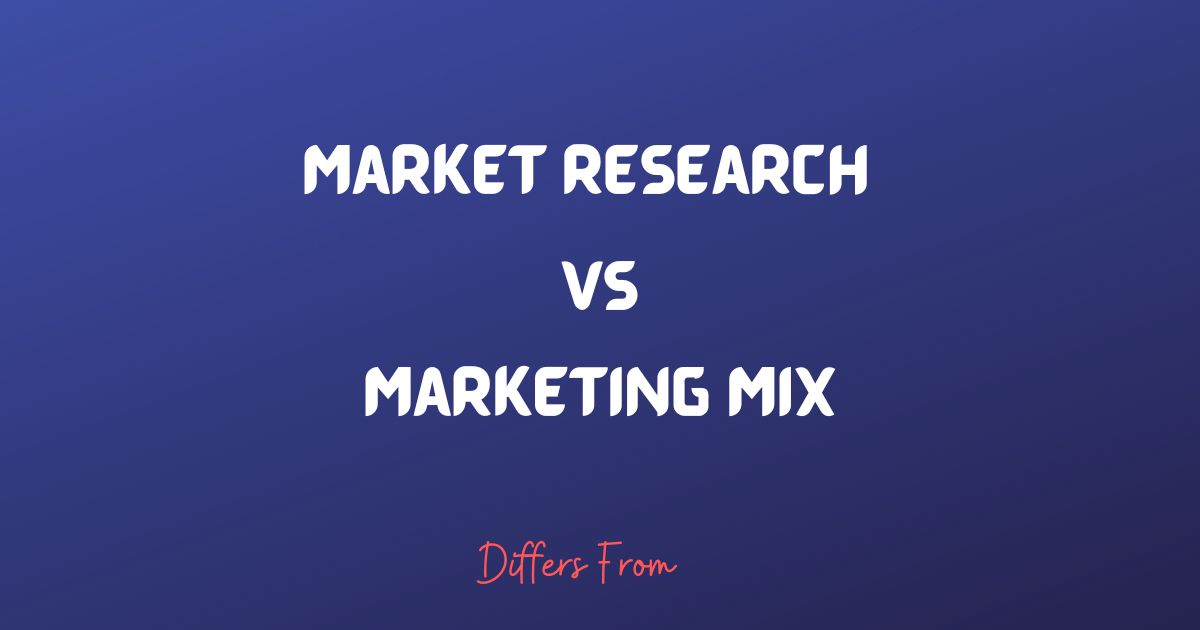In the ever-changing world of business and marketing, two key terms often take the spotlight, and they’re quite different in what they do. Market research and marketing mix are two important building blocks for a successful business strategy.
However, they have distinct roles and goals. As we start this journey of understanding, we’ll explore market research and marketing mix in a simple and clear way.
Whether you’re an experienced marketer looking for a quick recap or someone new to the world of marketing, this exploration will help you grasp these concepts so you can make better decisions and use them effectively.
Join us as we untangle the complexities of market research and marketing mix, uncovering the important differences that will enable you to make smarter choices in your business ventures.
Let’s get started by getting to the basics of these two fundamental aspects of marketing strategy.
Difference between Market Research and Marketing Mix
| Market Research | Marketing Mix | |
| Definition | Understanding the market environment, customer needs, and competitive landscape. | Comprises product, Price, Place and Promotion, Outlining the practical application of market strategy. |
| Focus | Consumer behavior, demographics, psychographics and market trends. | Specific elements and strategies to influence consumer perception and purchase decisions. |
| Purpose | Implementation of marketing strategy. | Gather data and insights for informed marketing decisions. |
| Timing | Developed after market research. | Conducted before developing the marketing strategy. |
| Components | Product (features, quality, design), Price (pricing strategy), Place (distribution strategy), Promotion (advertising, promotions, PR). | Surveys, Interviews, Data analysis etc. |
| Interaction | Informed by market research insights. | Inform marketing mix decisions. |
What is market research?
Market research is the process of gathering and analyzing data about consumer preferences, market trends, and competition.
It involves collecting information through surveys, interviews, and data analysis to gain insights into target markets and make informed business decisions.
According to a study by the Market Research Society, 74% of businesses believe that market research helps them make better decisions, while another report by IBISWorld indicates that the market research industry generates around $22 billion in annual revenue in the United States.
What is the marketing mix?
The marketing mix refers to the set of controllable variables that a company combines to satisfy customer needs and achieve its marketing objectives.
It consists of four core elements: product (the goods or services offered), price (the cost customers pay), place (the distribution channels used to reach customers), and promotion (the communication strategies employed to promote the product).
The marketing mix helps companies create a compelling value proposition and effectively reach their target market.
Comparison between market research and marketing mix
Market research and the marketing mix are two distinct concepts within the field of marketing, but they are closely related and often work together to help businesses understand and address consumer needs and preferences. Here’s a comparison between the two:
Definition:
- Market Research: Market research involves the systematic gathering, analysis, and interpretation of data and information about a specific market or target audience. It aims to understand consumer behavior, preferences, and trends to make informed marketing decisions.
- Marketing Mix: The marketing mix, often referred to as the 4Ps, consists of four key elements that make up a marketing strategy – Product, Price, Place (Distribution), and Promotion. It’s about how a company combines these elements to create value for its target market.
Focus:
- Market Research: Market research primarily focuses on understanding the market environment, customer needs, and competitive landscape. It provides insights into consumer behavior, demographics, psychographics, and market trends.
- Marketing Mix: The marketing mix focuses on the specific elements and strategies a company uses to influence consumer perceptions and purchase decisions. It addresses product design, pricing strategy, distribution channels, and promotional tactics.
Purpose:
- Market Research: The main purpose of market research is to gather data and insights that can inform marketing decisions. It helps companies understand their customers better and identify opportunities and challenges in the market.
- Marketing Mix: The marketing mix defines how a company plans to implement its marketing strategy. It outlines how the company will position its product, set prices, choose distribution channels, and promote the product to achieve its marketing objectives.
Timing:
- Market Research: Market research is typically conducted before developing a marketing strategy. It provides the foundation for making informed marketing mix decisions.
- Marketing Mix: The marketing mix is developed after market research has been conducted. It is the practical application of the insights gathered from research.
Components:
- Market Research: It includes methods such as surveys, interviews, focus groups, observation, and data analysis to collect and interpret information about the market and consumers.
- Marketing Mix: It comprises the 4Ps – Product (features, design, quality), Price (pricing strategy), Place (distribution strategy), and Promotion (advertising, sales promotions, public relations).
Interaction:
- Market Research and Marketing Mix: Market research is an essential input into the development of a marketing mix. The insights from market research help marketers make informed decisions about product features, pricing, distribution, and promotional activities.
Pros of Market Research
- Informed Decision Making: Market research provides valuable insights that enable informed business decisions, reducing the risk of guesswork and assumptions.
- Customer Understanding: It helps businesses understand their target customers, their needs, preferences, and behavior, leading to the development of products and services that better align with customer expectations.
- Competitive Advantage: Market research helps identify market trends and competition, allowing companies to differentiate themselves and gain a competitive edge.
- Mitigating Risks: By analyzing market data, businesses can identify potential risks and challenges in the market, enabling proactive risk mitigation strategies.
- Identifying Opportunities: Market research uncovers new market opportunities, niche segments, and untapped customer needs, allowing businesses to capitalize on them.
Cons and Pros of Market Research
Cons of Market Research
- Cost: Market research can be costly, especially if extensive data collection, analysis, and professional expertise are required.
- Time-Consuming: Gathering and analyzing market data can be a time-consuming process, delaying decision-making and product development timelines.
- Potential Bias: Research outcomes may be influenced by inherent biases, sample selection limitations, or inaccuracies in data collection methods.
Cons and Pros of Marketing Mix
Pros of Marketing Mix
- Strategic Framework: The marketing mix provides a structured framework for companies to analyze and make strategic decisions about their product, price, place, and promotion strategies.
- Customization: It allows companies to tailor their marketing efforts to meet the specific needs and preferences of their target market segments, enhancing customer satisfaction.
- Integrated Approach: The marketing mix encourages a holistic and coordinated approach to marketing, ensuring that all elements work together to deliver a cohesive message and value proposition to customers.
- Flexibility: The marketing mix can be adjusted and modified based on market dynamics, customer feedback, and business objectives, allowing companies to adapt to changing conditions.
Cons of Marketing Mix
- Complex Decision-Making: Determining the optimal combination of product, price, place, and promotion requires careful analysis and decision-making, which can be complex and time-consuming.
- Resource Intensive: Implementing an effective marketing mix often requires significant financial and human resources to develop, execute, and monitor marketing strategies and activities.
- Market Volatility: The marketing mix may need to be adjusted frequently to respond to market changes, making it challenging to maintain consistency and stability in marketing efforts.
Conclusion
Market research focuses on understanding customer preferences and gathering data, while the marketing mix is the implementation of that research, determining how the product is designed, priced, distributed, and promoted to create value for customers and achieve marketing goals.

